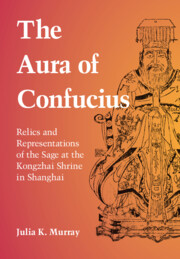Book contents
- The Aura of Confucius
- The Aura of Confucius
- Copyright page
- Dedication
- Contents
- Figures
- Acknowledgments
- Introduction
- Part I Confucius in Qufu and Kongzhai
- 1 Confucius and His Cults
- 2 Proposing a History of Kongzhai
- 3 Visual Representations of Confucius at Kongzhai
- Part II The Rhetorical Construction of Kongzhai
- Appendix Timeline
- Notes
- Bibliography
- Index
1 - Confucius and His Cults
from Part I - Confucius in Qufu and Kongzhai
Published online by Cambridge University Press: 24 December 2021
- The Aura of Confucius
- The Aura of Confucius
- Copyright page
- Dedication
- Contents
- Figures
- Acknowledgments
- Introduction
- Part I Confucius in Qufu and Kongzhai
- 1 Confucius and His Cults
- 2 Proposing a History of Kongzhai
- 3 Visual Representations of Confucius at Kongzhai
- Part II The Rhetorical Construction of Kongzhai
- Appendix Timeline
- Notes
- Bibliography
- Index
Summary
In order to place Kongzhai in larger contexts, the three chapters in this section present basic information about the veneration of Confucius, reconstruct Kongzhai’s chronological history, and survey its visual and material representations. Chapter 1 outlines the life of Confucius, beliefs about him, and the evolution of his cult. Practices of venerating Confucius started in Qufu and gradually spread elsewhere, with family-ancestral worship transmitted by migratory Kong descendants and an official cult promoted by political leaders. Ritual sites in Qufu itself, evocatively called Queli, attracted the educated elite to pay respects to Confucius and experience his spiritual aura in his former haunts. Several of Kongzhai’s Ming and Qing patrons visited Qufu and brought back ideas and models to use for developing Qingpu’s “Little Queli.” Some activists also knew about the kinds of support that official and family temples had received, inspiring many petitions seeking comparable arrangements for Kongzhai. Whether or not these advocates truly believed that Confucius’s clothing was buried there, Confucian modes of veneration offered a range of cultural resources to exploit as a means of attracting recognition, prestige, and even economic benefits for the locality.
- Type
- Chapter
- Information
- The Aura of ConfuciusRelics and Representations of the Sage at the Kongzhai Shrine in Shanghai, pp. 17 - 35Publisher: Cambridge University PressPrint publication year: 2021



